| Srl | Item |
| 1 |
ID:
083615
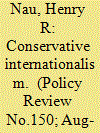

|
|
|
| 2 |
ID:
173035
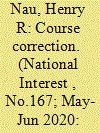

|
|
|
|
|
| Summary/Abstract |
Trump is providing a course correction for the postwar global order that may be the best hope for sustaining it. His policies may moderate the radical changes of the past seventy-five years, but they are unlikely to reverse them.
|
|
|
|
|
|
|
|
|
|
|
|
|
|
|
|
| 3 |
ID:
162059


|
|
|
|
|
| Summary/Abstract |
America is getting a third chance to strike the right balance between nationalism and globalism. The first chance dates back to its origins: as a new and vulnerable republic in a world of warring monarchs, it opted for nationalism, pursuing George Washington’s admonition “to steer clear of foreign entanglements.” Even as late as the 1930s, under the Neutrality Act, it refused to take sides in the momentous conflicts brewing in Europe and Asia. The second chance came after World War II. America turned to globalism, adopting Woodrow Wilson’s and Franklin Roosevelt’s internationalist strategy to transform the decentralized nation-state, balance of power system into the centralized global institutions of the United Nations (UN). When the Cold War paralyzed the UN, the United States became the superpower leader of a politically and economically integrated Western world. It assumed disproportionate burdens and nurtured the West to victory in the Cold War.
|
|
|
|
|
|
|
|
|
|
|
|
|
|
|
|
| 4 |
ID:
106340
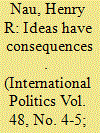

|
|
|
|
|
| Publication |
2011.
|
| Summary/Abstract |
In this essay, I make the case that the Cold War was caused by a competition of ideas rather than by a struggle for power or a failure of international institutions. The Cold War started when two sets of ideas diverged sufficiently - capitalism and communism - that they precluded either a realist - spheres of influence - or liberal - United Nations - solution to postwar differences in Europe. It ended when one set of ideas prevailed, and democracy and markets spread throughout the whole of Europe, eclipsing realist and liberal outcomes. The Soviet Union disappeared, which realists never expected; whereas the United Nations, which functioned briefly as a classic liberal collective security operation in the first Persian Gulf War, was quickly replaced by a democratic NATO in Bosnia and Kosovo. The competition of ideas did not end in the 1990s, however. It continues today in other forms and will shape the contours of military conflict and international cooperation in tomorrow's world, no less that it did during the Cold War.
|
|
|
|
|
|
|
|
|
|
|
|
|
|
|
|
| 5 |
ID:
031107
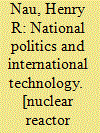

|
|
|
|
|
| Publication |
Baltimore, Johns Hopkings University press, 1974.
|
| Description |
xvi, 287p.
|
| Standard Number |
0801815061
|
|
|
|
|
|
|
|
|
|
|
|
Copies: C:1/I:0,R:0,Q:0
Circulation
| Accession# | Call# | Current Location | Status | Policy | Location |
| 015003 | 333.79240940/NAU 015003 | Main | On Shelf | General | |
|
|
|
|
| 6 |
ID:
060270


|
|
|
|
|
| Publication |
Winter 2004-05.
|
|
|
|
|
|
|
|
|
|
|
|
|
|
|
|
| 7 |
ID:
161755
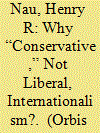

|
|
|
|
|
| Summary/Abstract |
There is no broad literature defining conservative internationalism as there is for liberal internationalism and realism. Yet conservative internationalism differs from liberal internationalism and realism in four important ways. First, it seeks a world of limited government or separate sovereign nations not big international institutions. Second, it believes that national security is a function of ideological differences not just relative power or diplomatic misunderstandings. The democratic peace is a much safer world for America than the balance of power or United Nations. Third, it recognizes the need to use force during negotiations, not just after negotiations fail, because authoritarian states will not take negotiations seriously if they can achieve their objectives outside negotiations. And fourth, it advances democracy conservatively by prioritizing regions where strong democracies exist nearby (today Ukraine and Korea) and by using military leverage to reach timely compromises that weaken authoritarian states.
|
|
|
|
|
|
|
|
|
|
|
|
|
|
|
|